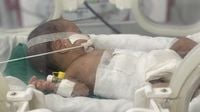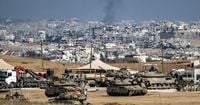Overnight Israeli airstrikes across the Gaza Strip have claimed the lives of at least 31 people, local hospitals confirmed on July 14, 2025, amid an escalating humanitarian crisis worsened by critical fuel shortages. The attacks come after high-profile talks between US President Donald Trump and Israeli Prime Minister Benjamin Netanyahu failed to yield a ceasefire or progress on hostage releases, leaving the region in a state of heightened tension and suffering.
The fatalities from the recent strikes are spread across Gaza. In the south, Nasser Hospital in Khan Younis reported 12 deaths, including three individuals who were waiting at an aid distribution point. Shifa Hospital in Gaza City received 12 bodies, among them three children and two women, after strikes in the northern part of the Strip. Central Gaza’s Al-Awda Hospital reported seven fatalities and 11 wounded. These numbers underscore the devastating toll on civilians in a conflict zone where militants and non-combatants are often intermingled.
On the Israeli side, three soldiers were killed in northern Gaza when an explosion destroyed their tank, likely due to an anti-tank missile. The incident remains under investigation, highlighting the ongoing dangers faced by both sides in this protracted conflict.
Fuel shortages have compounded the crisis, with United Nations agencies issuing dire warnings about the impact on hospitals and critical infrastructure. Without adequate fuel, hospitals are going dark, ambulances are immobilized, and essential services such as water production, sanitation, telecommunications, and food distribution are on the brink of collapse. The UN humanitarian office (OCHA), World Food Programme (WFP), World Health Organization (WHO), UNICEF, UNRWA, UNFPA, UNDP, and UNOPS collectively stressed that "fuel must be allowed into Gaza in sufficient quantities and consistently to sustain life-saving operations." Although 150,000 liters of fuel entered Gaza last week — the first delivery in 130 days — this amount represents only a fraction of what is required daily.
Hospitals are particularly hard-hit. At al-Helou Hospital in Gaza City, the paediatric ward, led by Mohammed Tabaja, is entirely dependent on fuel-powered generators. The hospital’s motor shuts down every two hours due to fuel shortages, causing electricity cuts that endanger the lives of newborns reliant on incubators and ventilators. Tabaja described an overcrowded ward with 12 incubators serving at least 22 infants, a staggering 180% occupancy rate. The ongoing conflict has also increased premature births and underweight infants, attributed to malnutrition and stress among pregnant women.
Dr. Ziad al-Masry, a fellow paediatrician at al-Helou, warned that 22 infants are currently at risk because power outages disrupt artificial respiration and monitoring systems. The hospital lacks an oxygen generator and relies on manually operated oxygen cylinders, placing enormous strain on medical staff. "Our fear is that we will reach the point where there's no electricity supply for the department at all, and that would be the biggest disaster," Tabaja said.
The situation extends beyond healthcare. Municipal authorities in central and southern Gaza announced the suspension of vital public services such as water well operations, sanitation, waste collection, rubble removal, and road clearing, citing a "complete interruption of fuel." This shutdown cripples daily life for Gaza’s 2 million residents and heightens the risk of a humanitarian catastrophe.
Caritas Jerusalem, a prominent humanitarian organization operating on the ground, has issued an urgent plea for international intervention. It described Gaza’s crisis as "unprecedented," with every sector of civilian life collapsing. Acute hunger grips the population as UN-supported bakeries have closed, and attacks on aid-seekers have led to 758 deaths and over 5,000 injuries since May 27, 2025, halting food deliveries. Hospitals are overwhelmed and under-resourced, facing critical shortages in medical supplies, fuel, and beds. In June alone, Gaza reported 484 suspected meningitis cases, while waterborne diseases and malnutrition are rising rapidly, with nearly 40% of illnesses now acute watery diarrhoea.
The education sector has also suffered devastating losses, with over 15,800 students and 700 education staff killed, and 85 temporary learning spaces disrupted, impacting more than 33,000 children. Education is virtually at a standstill amid the ongoing conflict and displacement.
Humanitarian access remains severely obstructed, with more than 680 trucks stuck at the border, unable to deliver essential supplies. Fuel shortages threaten to plunge Gaza into a total communication blackout, further isolating the population. Despite these challenges, Caritas Jerusalem continues to operate 10 medical points and a central clinic in Gaza City, providing psychosocial support to traumatized children and women, as well as multipurpose cash assistance to vulnerable families.
The humanitarian crisis is further exacerbated by violence in the occupied West Bank, where radical Israeli settlers set fire near the cemetery and the 5th-century Church of Saint George in the Christian village of Taybeh on July 7, 2025. The Council of Patriarchs and Heads of Churches of Jerusalem visited Taybeh on July 14 to express solidarity and called for a transparent investigation into police failures to respond to emergency calls.
Israel’s military reported that a June 19 strike killed Muhammad Nasr Ali Quneita, a senior Hamas militant involved in the October 7, 2023, attack that killed over 1,200 people and took 251 hostages, including dual Israeli-British citizen Emily Damari. Although most hostages have been released in ceasefire agreements or other deals, about 50 remain held, with fewer than half believed alive.
The retaliatory Israeli offensive has killed more than 58,000 Palestinians, according to Gaza’s Health Ministry, which is run by Hamas and led by medical professionals. Women and children make up more than half of the casualties. The ministry’s figures are widely regarded by the United Nations and other experts as the most reliable tally of war casualties, despite Israel’s refusal to distinguish between militants and civilians.
Israel’s air and ground campaign has devastated vast areas of Gaza, displacing roughly 90% of its population. Aid groups report immense difficulties in delivering food and medical assistance due to Israeli military restrictions and the breakdown of law and order. Experts warn that famine looms as the crisis worsens.
Meanwhile, Israel’s Knesset voted on a controversial attempt to expel Arab lawmaker Ayman Odeh, related to his January 2025 social media post welcoming the release of Israeli hostages and Palestinian prisoners. The motion failed to reach the required threshold, with 73 votes in favor and 90 needed. Odeh denies allegations of supporting terror, and many Palestinians see those imprisoned by Israel as freedom fighters resisting occupation. Israel’s Arab minority, constituting about 20% of the population, faces widespread discrimination and is often viewed with suspicion by Jewish Israelis due to familial and cultural ties to Palestinians.
The situation in Gaza remains dire, with no immediate end in sight. The international community faces mounting pressure to address the fuel crisis and humanitarian access, while the lives of countless civilians—especially vulnerable infants and children—hang in the balance. As Caritas Jerusalem and UN agencies implore for immediate ceasefire and aid delivery, the question remains: can relief reach those who need it most before the crisis deepens further?





